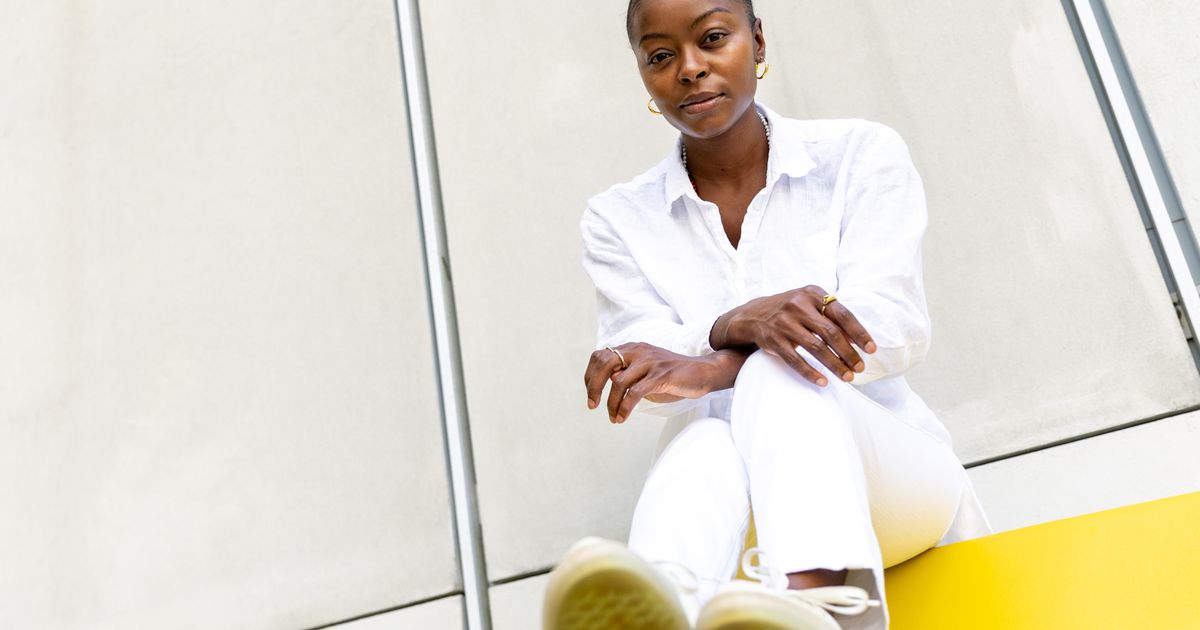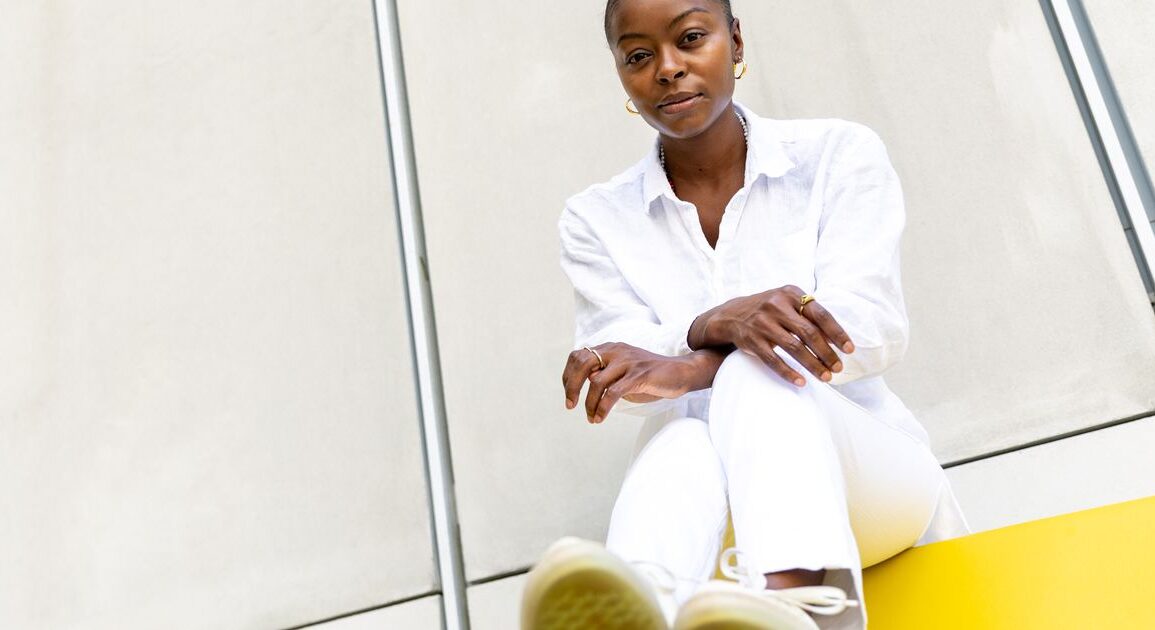
In Danielle Deadwyler’s “Kitchen Installations” video series, she is dressed in a yellow apron and black lingerie with her hair pinned up in plaits. She wears loafers on her feet while scrubbing the oven in the kitchen of a midcentury home. A chopped and screwed sample of French Montana’s “Pop That” on repeat saying “work, work, work” underscores the in-and-out scrubbing motion. It evokes both the image of poet Sylvia Plath’s death and a sexual act. The piece is a contemplation on the expectations put upon Black women’s bodies, both sexually and domestically.
“I have been tackling, since my son Ezra was 4, what it means to have to negotiate labor responsibilities,” said Deadwyler, 42. “When I was a kid I knew my mom had children and was negotiating being a mother and wife … All of the Black women I know are doing all of the things.”
Juggling self-hood and motherhood has been at the core of Deadwyler’s work as an artist. It was at the heart of the 2022 movie “Till,” in which she portrayed Mamie Till Mobley, who became a civil rights activist after her 14-year-old son Emmett was beaten and drowned to death while visiting relatives in Mississippi. And it colors her work as a visual artist, combining performance art, film, photography and music to explore Black women’s labor with a focus on sex work and domestic work.
“Kitchen Installations” was on display as a part of “The Alchemists” exhibition at Johnson Lowe Gallery earlier this year. And now she’s returned to the gallery with more multimedia work as part of the “In Unity as in Division” exhibition, on view through Nov. 11.
Credit: William Twitty Photography
Credit: William Twitty Photography
“I grew up on Stewart Avenue where there were many strip clubs around the corner from my house,” Deadwyler said. “Girls in my community who worked in clubs or on the streets weren’t bad people. With my art, I want to complicate people’s perceptions and ideas across the board.”
Curated by Executive Director Donovan Johnson, “In Unity as in Division” features works by seven emerging artists who call Atlanta home. Johnson, who succeeded gallery founder Bill Lowe after his death earlier this year, emphasizes elevating local artists from historically excluded groups as mission critical for the gallery. Other featured artists include Demetri Burke, Leia Genis, Wihro Kim, Masela Nkolo, Sergio Suárez and Ellex Swavoni.
Their works will be displayed in what Johnson calls micro-exhibits, or salons, where each artist’s pieces will be in their own room, so they can be taken in as individuals. The seven artists taken together form a quilt of Atlanta’s cultural landscape, he says.
Talking about Deadwyler’s work, Johnson observes that “when people from other places think about Atlanta, they often mention places like Magic City; even Jazmine Sullivan’s song ‘The Other Side’ is about moving to Atlanta and becoming successful, specifically utilizing her body to reclaim control of her success.” He sees that reality reflected in Deadwyler’s work. “In the music Danielle overlays (in “Kitchen Installation”), you have the voice of a male rapper whose lyrics evoke performative actions from an audience that can only be assumed to be black women.”
For those familiar with her stage and film work, Deadwyler’s foray into visual art may seem like a departure, but it’s not. She was born and raised in Atlanta, and her parents got her in the arts early, starting with Marlene Rounds School of Dance when she was 4 years old. After graduating from Grady High School, she attended Spelman College and went on to earn master’s degrees in American studies from Columbia University and poetry from Ashland University.
“My grad school work was on Black female strippers in the South as positive representation in hip-hop,” Deadwyler said. “I am taking that academic work and connecting it to my constant experience at the time. What is the difference between a domestic or sex working Black mother and all of the other jobs we perform in conjunction with all of the community work we do? I feel like my body needed to get it out.”
Credit: arvin.temkar@ajc.com
Credit: arvin.temkar@ajc.com
Deadwyler taught elementary school at Neighborhood Charter Schools for a couple of years before returning to her true passion: performance-based storytelling. She made her mark with memorable roles in plays such as “Goodnight, Tyler” at the Alliance Theatre, “The Book Club Play” at Horizon Theatre and “Smart People” at True Colors Theatre.
However, it was one of her earlier roles in 2009 that may have planted the seed for her future career. While pregnant, she played Lady in Yellow in Ntozake Shange’s choreopoem, “For Colored Girls Who Have Considered Suicide / When the Rainbow is Enuf,” at True Colors. It is in this play that Tyler Perry likely saw Deadwyler for the first time and would later cast her as the gritty and unrelenting character, Quita Maxwell, on his OWN series “The Haves and the Have-Nots” beginning in 2013.
Still, she continued producing visual art. That same year she created an original piece about Black women’s labor for Spelman Museum of Fine Art’s Black Box series.
Like many Atlanta actors, as the television and film industry in Atlanta has blossomed, so has Deadwyler’s career.
“Around 2017-2018, that was a critical mass moment of auditions and a shift in the way I was looked at,” Deadwyler recalled. “When you gotta ride a film and TV train, you gotta ride. You have full will to do what you want, but the question is, what are you gonna do to make money?”
Over the last five years, Deadwyler has made memorable comedic appearances on TV shows like “Atlanta” (“Champagne Papi” episode) and “P-Valley,” both of which were filmed here. She also delivered visceral performances in the Black Western feature film “The Harder They Fall” and the dramatic, post-apocalyptic mini-series “Station Eleven.”
“No role is small,” Deadwyler said. “Andrea Frye (an Atlanta-based actress and director) taught me you elevate everything you do. I can do anything. That’s how I’ve been raised as an artist, to throw myself fully into it. Black women are capable of existing on the full spectrum of ability. Why not show that?”
Credit: Lynsey Weatherspoon / Orion Pict
Credit: Lynsey Weatherspoon / Orion Pict
As the mom of a teenage son, Deadwyler said her role in “Till” resonated with her as she was seeing headlines about unarmed Black men being killed by racist vigilantes. Life and art intersected, and for her performance Deadwyler earned Screen Actors Guild, Critic’s Choice and NAACP Image Award nominations.
At the time of this interview — before the SAG-AFTRA actors’ strike — she was on set filming August Wilson’s “The Piano Lesson” for Netflix, while eagerly awaiting the release of two other major films. All that is on hold now until an agreement is reached. But once again, life and art have intersected as the strikes bring up labor issues around fairness, collective bargaining and how we value each other’s humanity. It harkens back to a body of work Deadwyler developed that was inspired by the Atlanta Washerwomen’s Strike of 1881 — parts of which will be on display at Johnson Lowe.
As for her own efforts, Deadwyler intends to keep herself open and her freedom close.
“Limiting myself is not ideal in any capacity, so I keep my hands in the ground to receive any kind of fertilizer available,” Deadwyler said. “My arms are always stretched wide, so I’m always thinking about visual art, theater, performance art, etc.”
“In Unity as in Division.” Through Nov. 11. Johnson Lowe Gallery, 764 Miami Circle NE, Suite 210, Atlanta. 404-352-8114, www.johnsonlowe.com
This post was originally published on this site be sure to check out more of their content.





